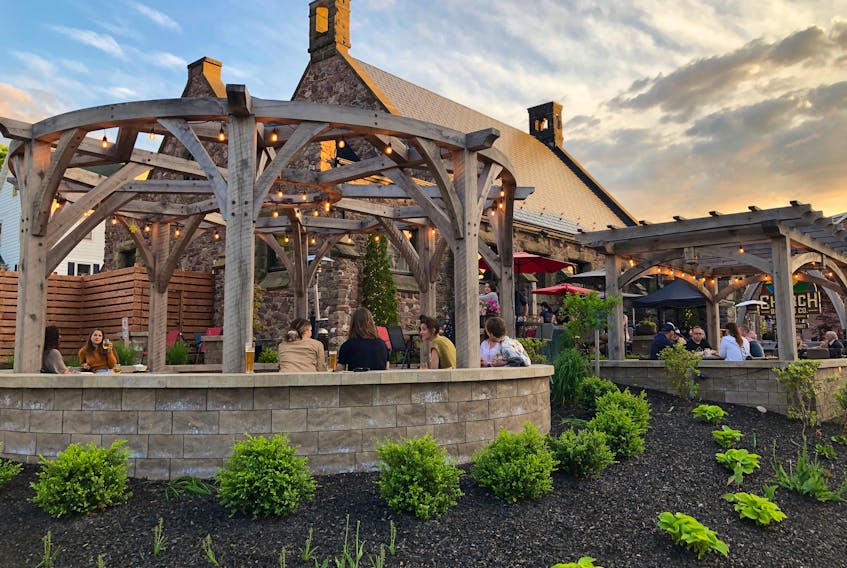Smaller breweries are doing for rural Nova Scotia what our government has long struggled with: creating viable businesses that support our local communities.
One such brewery is Wolfville’s Church Brewing Company. The brewery, located on Main Street, is the brainchild of brothers Steve and Matt Haysom. While the brewery is still in its infancy, just a scant 18 months old, it is already the second-largest employer in Wolfville, second only to Acadia.
As a food and drink writer, I find the back story often as compelling as the final products themselves. Ultimately, great drink is a reflection not just of ingredients and process but the people that make them. In the case of Church Brewing’s ownership group, I have been thoroughly impressed with the vision behind the brewery. Their story, like so many others, is about young, open-minded business people seeking to be part of the rich fabric of the Nova Scotia artisan food and drink scene. They are driven by their ideals of building community, which not surprisingly, had given them the reward of having their customers (or congregation) vocally singing their praises.
Start of a dream
Not unlike many Nova Scotians seeking employment, Matt and Steve both moved to Alberta following university to work in the oil industry with a plan to return to Nova Scotia within three to five years. Over 20 years later, they finally made it back home. They always knew they wanted to return, but it wasn’t until 2012, at their annual family retreat at White Point Beach Resort, that a plan started taking shape.
According to Matt, “one night, we were sitting by the beach, having some beer, joking around, when we thought – not too seriously at the moment - of the idea of building a brewery in rural Nova Scotia. I asked Steve what he thought the name should be. He retorted ‘the Church Brewing Company’…and thus it was born, from that moment we started sketching ideas for a brewery that was to be located in a restored church.”
Next, the brothers set out on a quest to find a church in a rural community to restore as a brewery. The brothers had long eyed Wolfville, as Steve’s wife Erin had gone to Acadia, so they had fond memories of the town and could envision raising families in the community. On their regular return visits to Nova Scotia, they also witnessed the exponential growth of the local wine and culinary scene. The notion of being part of a vibrant agricultural community was particularly appealing.
Eventually, luck was on their side as they were able to convince the then owner/local developer of the former St. Andrew’s United Church to sell them the property. There were many obstacles along the way; acquiring a development permit from the Town of Wolfville, attending a Nova Scotia Judicial Review, and participating in public hearings to amend town bylaws. Their biggest challenge was to restore the more than 100-year-old church and build a new, attached microbrewery while maintaining the integrity and historical significance of this church so that it could again be a place to congregate.
Add in the brothers’ commitment to use almost exclusively local tradespeople and the simple idea of a brewery, sketched out on a cocktail napkin just a few years before, became a project challenge of how to preserve the past while incorporating modern conveniences.
In addition to the issues of updating wiring in a heritage building, there were numerous other challenges not least of which was installing an HVAC system that could accommodate both the restaurant, located in the original church structure, and also the modern brewhouse added as an attached building to the back of the property.

Revitalizing a church
As it turns out, the restoration of the church – home to the brewery’s restaurant - would be far more complex than building a new brewhouse.
Above the aforementioned challenges, the brothers were faced with a unique design issue. How do you preserve the integrity of a church constructed from rare red oak? Finding red oak alone is a challenge, but vintage red oak should have been near impossible.
Luckily, a developer in Halifax, at the same time, was tearing down the former St. John’s United Church, located at the corner of Willow and Windsor Street, which just happened to also be built in 1914 using the same red oak as found in St. Andrew’s United Church. Bonus: the church had several brass chiming bells, a full six tonnes worth, dating back to just after the Halifax Explosion. In fact, the bells replaced similar bells damaged by the explosion, lending a remarkable story to tell for visitors to the brewery, where they are proudly displayed.
The bells have become one of the symbols of the brewery, along with the church’s original stain glasses window, which has become an emblem of the business. They even named one of their beers 8 Bells in honour of their find.

About the beer
8 Bells is a Belgian-style pale ale brewed with a little North American twist, including using locally-derived oats, dry hopping of the beer with West Coast hops to give it a little citrusy life to go along with the fruit esters derived from the Belgian yeast strain used to brew the beer.
The beer is reflective of the brewery’s style. They focus on Belgian and Germanic styles but never feel confined to 100 per cent traditional recipes. The concept was purpose-driven, as it allowed them to differentiate themselves from a craft beer landscape overflowing with IPA (India Pale Ale) and produce a range of styles from a lower alcohol Trappist Belgian Single (Enkel) up to higher strength Double (Dubbel) brews. I believe a Belgian triple could be in their sights, but time will tell.
While the brewery relies primarily on imported malts and hops – as most craft brewers do – they buy their specialty malts from Horton Ridge Malt and Grain Co., a local malting business, just a few minutes drive from the brewery. While supply of input is limited on the brewing side, the company focuses its efforts on supporting local through the restaurant, managing to source more than 80 per cent of its needs from local producers, which includes craft beer, cider, and wine from other local producers.
It is this purity and focus on a sustainable local business rooted in community that makes Church a must-visit for any foodie. And the beer is great, too!
On your next Valley wine adventure, be sure to stop by Church Brewing Company. And, if you can’t, the brewery does weekly, potentially bi-weekly, home deliveries of beer to the HRM and Greater Annapolis Valley.
Learn more:
This week on In a Jiffy, we chat scallops with Chef Dwayne Macleod, executive chef of the Agricola Street Brasseries, CUT and Shuck Seafood + Raw Bar. We'll learn from a pro how to perfectly sear scallops and I'll teach you a delicious summer appetizer recipe featuring local scallops and farm-fresh local vegetables paired with a delicious brew from the brewery. And we do it ‘In a Jiffy’.










